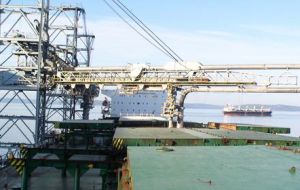MercoPress. South Atlantic News Agency
Greater ports congestion forecasted in Brazil with record soy crop and delayed sugar shipments
 “The real choke-point in Brazil’s infrastructure is the capacity to load grain at the ports”
“The real choke-point in Brazil’s infrastructure is the capacity to load grain at the ports” Brazil’s delays loading soybeans for export may worsen in 2014 due to a bigger crop and as some grain facilities are used for sugar shipments, crop analyst Soybean & Corn Advisor Inc. said.
Waiting times for vessels may give U.S. soybean exporters a longer selling window and potentially lift US export volumes, Michael Cordonnier, president and owner of the Hinsdale, Illinois-based firm, wrote in an online report on Wednesday.
Brazil is forecast to harvest a record 88 million metric tons of soybeans in 2013-14, the US Department of Agriculture estimates. A fire at the port of Santos on Oct. 18 that destroyed sugar warehouses may mean some grain facilities will be used for exports of the sweetener, Cordonnier wrote.
“A good analogy for the infrastructure problems in Brazil is an hour glass,” Cordonnier said. “In 2014, the top of the hour glass is going to get bigger with a record large soybeans crop and the restricted part of the hour glass, which are the ports in Brazil, is going to get a little smaller in 2014 due to the fire at Santos.”
Brazil may export 1 million tons of soybeans by the end of February after early planting was delayed by a week, and the “real logistical problems” will start in March as the record crop starts heading to the ports, according to Cordonnier.
“The real choke-point in Brazil’s infrastructure is the capacity to load grain at the ports,” the analyst wrote.
Shipping problems and delays are “inevitable” because all of Brazil’s ports were already working at capacity, and the fire means a significant part of capacity at the port of Santos will be out of order for many months, the analyst said.
“The result could be longer waiting times for vessels and more congestion all throughout the system all the way back to the local grain elevators in the interior,” Cordonnier wrote. “If a vessel is forced to wait 60, 70, 80 days to load soybeans from Brazil, it could end up being cheaper getting the soybeans from the U.S. even if the price of the commodity is a little higher.”
An industry association said on Tuesday it expected record sugar cane production in Brazil in 2013-14, with an ever-growing share going to ethanol output. Unica, which represents 60% of the country's sugar cane producers and processors, said the harvest in the main producing region in central-southern Brazil should total 587 million tons, up 10.18% from the previous one.
“This is going to be a bumper crop. The sector is returning to normal after three years of major turmoil,” Unica president Elizabeth Farina told a press conference.
The association said its members' mills should yield as much sugar as last year (34 million tons) and significantly increase their output of ethanol, a sugar-based bio-fuel.




Top Comments
Disclaimer & comment rules-

-

-

Read all commentsEverything that gives plant. Brazilian blessed land. As ChrisR says, the important thing is to meet “Mr. Market”. When soy is not good for the market, we plant corn or cotton or coffee or sugar cane or create cows. Our power is in the rapid development of productive chains, not on a given plantation.
Oct 31st, 2013 - 10:35 am 0Our infrastructure improves fast. With investment will solve everything. From 1975 to 2006 nothing was done, we only pay foreign debt. Our project companies were forgotten or lost efficiency.
We need our best qualified professionals. QUICK!
Brasileiro, can you take a Retard with the name “chris” that claims that he sold his “gold” to live in Uruguay, but can't speak one word Spanish, nor one word Portuguese, admitted that he never visited Brazil, only knows Brazil and the rest of South American nations by reading Wikipedia and is obsessed with playing with dildo's?
Oct 31st, 2013 - 12:22 pm 0Great comment btw.
Fortunately Uruguay can provide port facilities - problem is to move the produce there.
Oct 31st, 2013 - 03:46 pm 0following “Export cargoes originated in Argentine ports can only be transshipped to other ports of Argentine jurisdiction or to ports from Mercosur and associate members which have cargo maritime transport agreements with Argentina”
http://en.mercopress.com/2013/10/30/botnia-upm-conflict-argentina-retaliates-against-uruguay-with-trade-and-port-measures
@ 2 Fido Dido - a big surprise for you!
You don't have to speak portugues or castallano to understand how the market works.
Commenting for this story is now closed.
If you have a Facebook account, become a fan and comment on our Facebook Page!